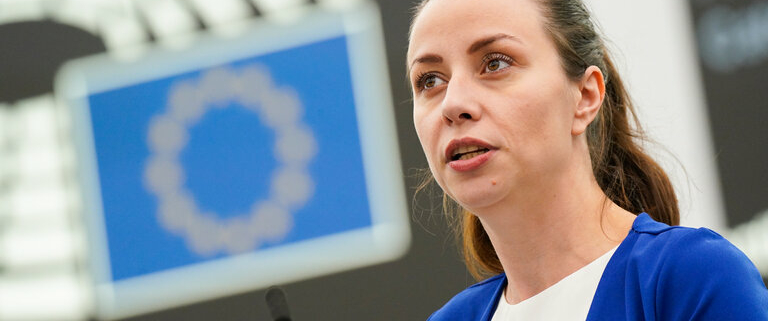MEP Irena Joveva discussed the situation of one year after the Morocco and Qatargate scandals – a review of measures to increase transparency and accountability in the European institutions at the plenary session in Strasbourg on Wednesday, December 13th 2023. She stressed, among other things, that weak measures strengthen political forces whose only goal is self-interest.
Joveva initially warned that the two scandals in question had severely damaged the credibility of the European Union, and people had rightly lost trust.
“I actually wonder myself how much corruption is still undisclosed. How much influence, illegal lobbying, or partial interests of MPs is there? How can many in this house still receive such large sums of money for sitting on various company supervisory boards?”
Unfortunately, not much has changed in this one year, the MP added. The ethics body, which is a toothless tiger anyway, is still not functioning.
“Transparency is necessary, but it is not enough. We need a serious body with the authority to investigate all conflicts of interest, to punish all illegalities.”
Joveva went on to emphasize that these basic standards are, after all, a necessary condition for democracy. Otherwise, it seems as if everyone in politics is the same:
“We are not, but through weak measures, political forces are being strengthened whose only goal is self-interest. The Qatargate case will remain a stain on the European Union. Let us take responsibility. Let us kill corruption with decisive measures and put corrupt politicians where they belong. Behind bars.”
You can watch the full speech here.
BACKGROUND
The Qatargate affair is a corruption scandal involving allegations that the governments of Qatar, Morocco and Mauritania, through European officials and lobbyists, attempted to influence decision-making in the European Parliament in their favor. The affair was first reported in December last year, when law enforcement authorities in Belgium, Italy and Greece seized a total of $1.6 million in cash. Eight people have been arrested on charges of corruption, organized crime and money laundering. Among the eight arrested is Eva Kailli, now a former vice-president of the European Parliament, who is at the center of the affair, where the defendants are accused of trading in political influence.
The arrests were immediately followed by a series of strong condemnations in the European Union, with the European Parliament, as the Union’s legislative body, committing to introducing the necessary reforms in the fight against corruption. In January this year, the President of the European Parliament, Roberta Metsola, presented a 14-point plan to reform the European Parliament’s ethics and transparency framework. In September, Parliament adopted a number of changes aimed at strengthening integrity, independence and accountability. The adopted reforms strengthened the rules on the transparency of MEPs’ declarations of private interests, included stricter penalties for breaches of the code of conduct, provided for clearer rules on the prevention of conflicts of interest and included mandatory declarations on the disclosure of meetings with lobbyists. The new code of conduct for MEPs entered into force in November.
Photo: EP – PHILIPPE BUISSIN




Leave a Reply
Want to join the discussion?Feel free to contribute!